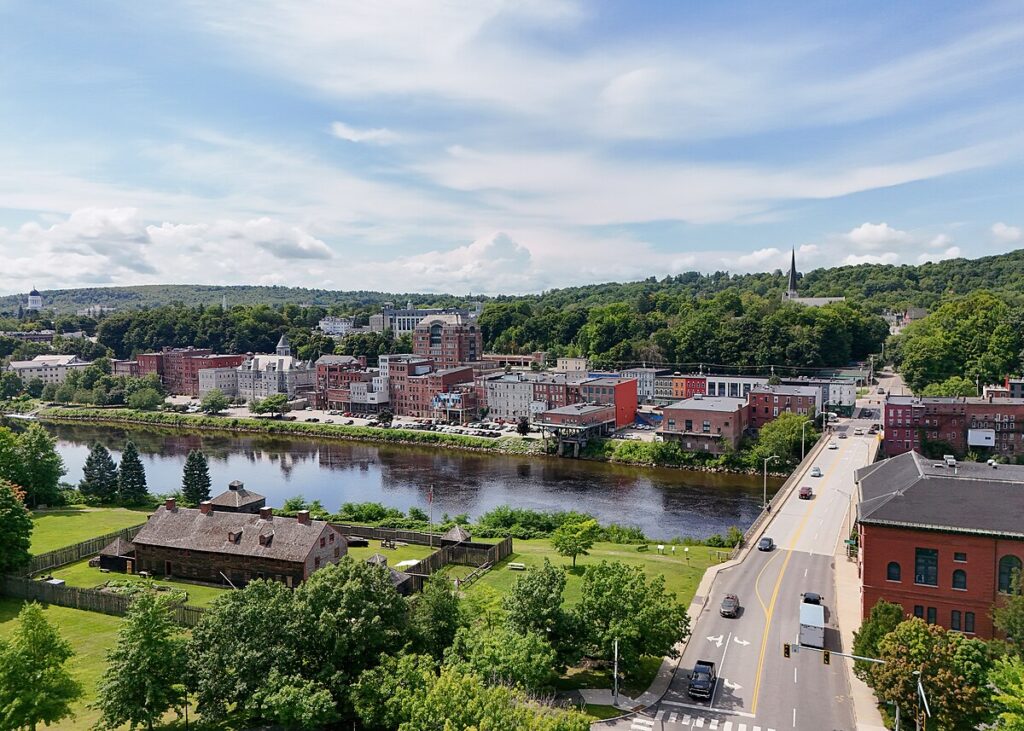
Moving to Augusta, Maine: A Comprehensive Relocation Guide
Considering moving to Augusta, Maine? This historic state capital offers government employment, Kennebec River beauty, and affordable New England living. With approximately 18,000 residents in 2025, Augusta combines political significance with small-city character and Central Maine’s capital atmosphere.
Demographic Profile to Consider If Moving to Augusta:
Augusta’s 2025 population is approximately 18,000 residents in this Kennebec County seat and Maine state capital along the Kennebec River. The median age is around 44 years, with state government workers, families, and retirees. The population is approximately 93% White, 3% Black or African American, 2% Hispanic, 1% Asian. Augusta features the Maine State House and government complex, historic downtown along the river, working-class neighborhoods, and serves as the political center. The city attracts state government employees, those seeking Maine affordability, and families wanting capital city living with small-city character. Augusta appeals to government workers prioritizing employment stability and affordable New England living. The community values state capitol status, Kennebec River heritage, government employment, and maintaining small-city atmosphere. Find trusted local services for moving, living, and working in Augusta 2.Augusta 2 Relocation Directory
Cost of Living to Consider If Moving to Augusta:
Augusta offers exceptional affordability for Maine and New England. Median home values range from $180,000 to $260,000 in 2025, significantly lower than coastal Maine and most New England while providing capital city amenities. The median household income is approximately $50,000. Rental properties average $900 to $1,300 monthly. Maine has no sales tax on groceries and prescription drugs; individual income tax is progressive 5.8%-7.15%. Property taxes are significant but lower than coastal areas. Heating costs are substantial in Maine winters. Overall cost of living is very competitive for New England, making Augusta highly attractive for state employees, working families, and those seeking Maine affordability. The city provides tremendous value with stable government employment. Housing costs create accessibility enabling comfortable living on government salaries.
Economy and Job Market:
Augusta’s economy revolves around state government (massive employer with thousands of state workers across all agencies and departments), healthcare, and services. The State of Maine government dominates employment. MaineGeneral Health provides extensive healthcare jobs. Typical industries include government, healthcare, retail, and services. The economy provides exceptional stability from state government employment though private sector opportunities are limited. State jobs offer benefits and security. Many residents accept government employment trade-offs for stability and Maine lifestyle.
Education:
Augusta Public Schools and surrounding district schools serve area students with Cony High School. School quality is adequate serving the working-class population. The University of Maine at Augusta provides higher education and community college programs. The educational infrastructure serves the capital city with schools reflecting government employment base.
Recreation and Lifestyle:
Augusta offers Maine State House providing tours and political atmosphere, Kennebec River providing recreation with trails and parks, historic downtown with local businesses, and Maine State Museum. The city features Capitol Park, Viles Arboretum, and Fort Western (historic fort and museum). Residents enjoy four-season outdoor recreation, proximity to Belgrade Lakes (15 minutes), access to coastal Maine (45 minutes to coast), and authentic Maine character. The lifestyle emphasizes affordable New England living, state government employment stability, outdoor recreation access, and small-city character. The four-season New England climate features cold, snowy winters and pleasant summers. The community values state capitol status, government employment (state workers form core community), Kennebec River heritage, outdoor recreation, and Maine character. Living in Augusta means accepting Central Maine isolation (1 hour to Portland, 2.5 hours to Boston), limited cultural offerings beyond capitol, government-dominated economy, harsh winters with substantial heating costs, working-class character, and capital city atmosphere while enjoying exceptional Maine affordability, stable state government employment with benefits, authentic Maine character without coastal tourism, beautiful Kennebec River setting, and four-season outdoor recreation access defining Central Maine’s political center where state government meets Maine affordability and capital atmosphere creates accessible New England living.
Healthcare and Services:
Augusta residents access comprehensive healthcare through MaineGeneral Medical Center providing regional medical services. The hospital serves Central Maine with quality care.
Transportation:
Augusta is accessed via Interstate 95, U.S. Route 201, Maine State Route 27, and various routes. Augusta State Airport provides general aviation. Most residents use personal vehicles. The location provides access to Portland (1 hour) and coastal Maine. Typical travel times to Portland are 1 hour, to Boston 2.5 hours.
Conclusion:
Moving to Augusta in 2025 offers affordable Maine capital living with state government employment, Kennebec River beauty, and New England character. The city’s combination of exceptionally low Maine housing costs, state government stability, and authentic character makes it ideal for state employees, working families, and those seeking Maine affordability where state capitol meets Kennebec River and exceptional value defines accessible New England living in the Pine Tree State’s political center.

